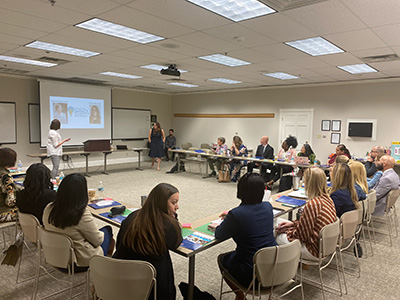Enhancing Mental Health Access
 We are fighting a childhood mental health epidemic and Texas Health Resources is prepared to do battle. By joining forces with the Meadows Mental Health Policy Institute (the Meadows Institute), we are helping North Texas schools build the tools and resources they need to help our youngest neighbors.
We are fighting a childhood mental health epidemic and Texas Health Resources is prepared to do battle. By joining forces with the Meadows Mental Health Policy Institute (the Meadows Institute), we are helping North Texas schools build the tools and resources they need to help our youngest neighbors.
Collaboration Is Key
In 2022, Texas Health provided a $200,000 grant to help the Meadows Institute launch a mental health program in 19 districts in North Texas, representing nearly 445,000 students, almost 58,000 school staff, and 675 schools across the region.
 The Meadows Institute utilizes Executive Learning Communities (ELCs), which bring senior school district officials together to learn from mental health experts and collaborate with one another to improve school mental health systems. Sessions center on combating the childhood mental health crisis.
The Meadows Institute utilizes Executive Learning Communities (ELCs), which bring senior school district officials together to learn from mental health experts and collaborate with one another to improve school mental health systems. Sessions center on combating the childhood mental health crisis.
Often district leaders are not familiar with counterparts in other districts and are forced to operate in isolation while navigating complex mental health needs. ELCs bring these leaders together for monthly training sessions and collaborations to help districts effectively execute mental health programs for their students. This is important because professional help with mental health issues is not always readily accessible for families, so schools may be their only source of support.
Due to increasing demand and overwhelmingly positive feedback, the Meadows Institute launched four new ELCs in 2023, and has added two more in 2024 in partnership with Texas Health. These two latest cohorts prioritize districts located in high-needs, under-resourced ZIP codes as identified by our Community Health Needs Assessment (CHNA). These neighborhoods not only have fewer available mental health resources, but they also face greater socioeconomic pressures, struggle with access to transportation and nutritious foods, and are at higher risks for preventable chronic disease. Because of these factors, students are more vulnerable to mental and behavioral health challenges.
 One ELC supports 11 North Texas districts located in priority ZIP Codes within Collin, Dallas, Ellis, Hunt, Kaufman, and Van Zandt counties. Topics include recognizing signs and symptoms of depression, screening tools and school interventions, multi-tiered systems of support, addressing trauma and grief, and staff well-being and support.
One ELC supports 11 North Texas districts located in priority ZIP Codes within Collin, Dallas, Ellis, Hunt, Kaufman, and Van Zandt counties. Topics include recognizing signs and symptoms of depression, screening tools and school interventions, multi-tiered systems of support, addressing trauma and grief, and staff well-being and support.
The Meadows Institute and Texas Health have also implemented a new ELC for districts in Tarrant, Wise, and Parker counties that will focus on reducing discipline that removes students from the classroom. The goal is to develop techniques to respond to challenging behaviors in ways that support students’ mental health, rather than using punitive measures that suspend students from the classroom. Such consequences are rarely proportionate to the offense, and often serve only to exacerbate the challenging behavior, creating a vicious cycle that often results in students dropping out of school.
You Can Help
The Texas Health Resources Foundation has committed to raise $400,000 to support the two new ELCs. Gifts from our donors will help ensure that these district leaders have access to unique and holistic training and learning experiences that they might not otherwise have access to. In addition leaders will have opportunities for collaboration, brainstorming, innovation, and support.
Facts to Know
- 1 in 5 children and youth will experience a mental related illness.
- Half of all mental health conditions manifest by age 14.
- 1 in 10 children and youth will have a serious disturbance that impacts daily functioning.
*Information provided by the National Alliance on Mental Illness (2019)
Quote:
"Through our partnership with the Meadows Mental Health Policy Institute and Texas Health Resources, we've undertaken a transformative journey, examining our systems of practice, uncovering gaps, and affecting real change for our students. Engaging in the Executive Learning Community, we've forged invaluable connections with colleagues from diverse districts, exchanging ideas, and strategically planning both immediate and enduring solutions."
--Dr. Summer Martin, Executive Director of Counseling and Prevention Services,
Richardson ISD
